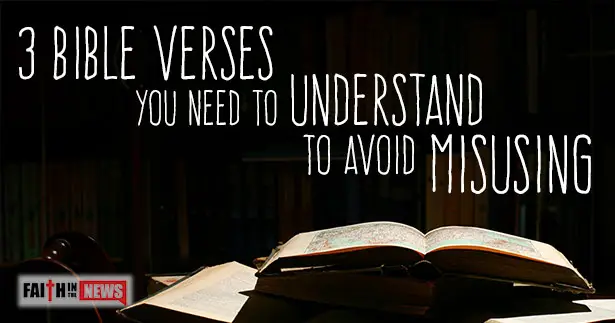What are 3 Bible verses we should know in order to not misuse them? What ones would you include?
Judge Not
Matthew 7:1 “Judge not, that you be not judged.”
This might be the most often quoted verse there is and it is almost always taken out of context and the non-believers will trot this one out, far and away the most frequently but they’ve taken it out of context. No verse should ever stand alone and be used as a system of beliefs but this is just what this verse is used for. We are not to condemn others but we are supposed to judge things and sin included. Don’t we all make judgments every day? We judge whether to wear a coat or not and we judge whether we should buy a car or not. The Hebrew word that Jesus used for “judge” is not what we think of as judging. The Hebrew word is “krinō” and it means “to separate, put asunder, to pick out, select, choose” so we should not use this word in the way we think of, at least in the context of one verse. Listen to the rest of what Jesus was saying in His conclusion of this thought in verse 5 “first take the plank out of your own eye, and then you will see clearly to remove the speck from your brother’s eye.” So if we have a bigger sin than the sin we are pointing out in others then we should make sure we’re not being hypocrites and have an even bigger sin when pointing out something exponentially smaller. Jesus didn’t say not to judge, but first get the big sin out of your own life and then you can see more clearly to help your brother or sister see the sin in their life. The church most certainly is to judge sin within the church (1 Cor 5; Matt 18:15-20). Jesus did not ever say “Do not judge” but that we shouldn’t be judging by sight or appearances as He said in John 7:24, “Do not judge by appearances, but judge with right judgment.”
Where Two or Three are Gathered
Matthew 18:20 “For where two or three gather in my name, there am I with them.”
Yes, Jesus is there any time two or three are gathered in His name but He is with us even if we are alone. This verse is part of what is called the Church Discipline Model given by Christ and must be read in the context of it. Matthew 18:15-20 is where Christ speaks about discipline in the church and here Jesus says that if a person sins against us, we should first go to them in private and if that doesn’t work, take another person or two with you as a witness.partly to make sure that we are not wrong but also to ensure the person is in a state of sin and that is seen by others. If these first two don’t work, then take it before the church and if that doesn’t work, they are to be treated as an unbeliever and most take this as being disfellowshiped. That’s why verse 20 is often taken out of context. Some believe they don’t need the church and that their own home church is all they need because they’ve got at least 2 or 3 people with them and so reason that “For where two or three gather in my name, there am I with them” but that is taking this verse out of its proper context.
That we might Become Rich?
Second Corinthians 8:9 “For you know the grace of our Lord Jesus Christ, that though he was rich, yet for your sake he became poor, so that you by his poverty might become rich.”
The health, wealth, and prosperity gospel peddlers love this one but they love money is why. They want you to plant a “seed of faith” (planted in their own pocket) so that God will release His harvest to you but I ask, “What chapter and verse is that?” In reading chapter 9 we see that it was the idea that Jesus left heaven and the riches of His glory, not the wealth of heaven, and became poor in the sense that He didn’t even have a place to lay His head at night (Luke 9:58) but was it for the purpose of making us rich? No, it was that we would become the heirs of God as His adopted children and could reign and rule with the Son of God. If they claim this verse as saying He came to earth and into poverty so that we could become rich, then they violate the contextual rule of reading the whole of the chapter by taking text out of context to make it a pretext and a false one at that. No, Jesus came to die for sinners, not to make us rich. If that was truly His goal, then He failed miserably, beginning with the first century church who most of which were very poor.
May God richly bless you,
Pastor Jack Wellman
[ssba]
Image source: CC BY Bret Jordan
Modifications: text added
Republished by Blog Post Promoter
 Faith in the News Christian News
Faith in the News Christian News



